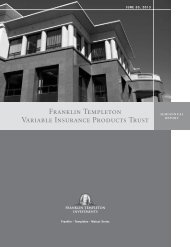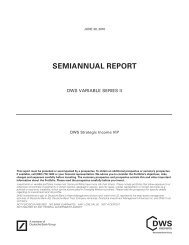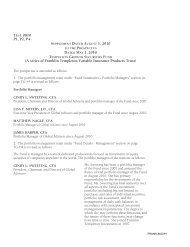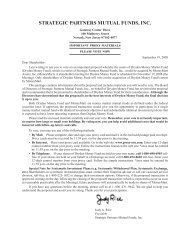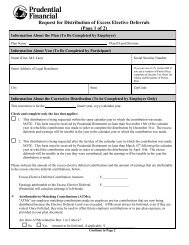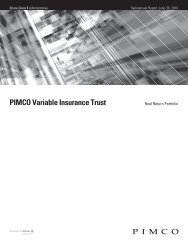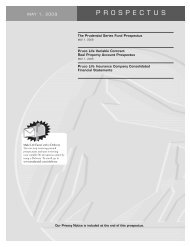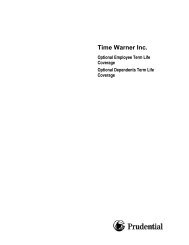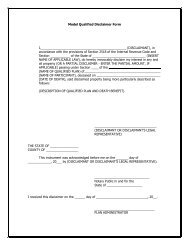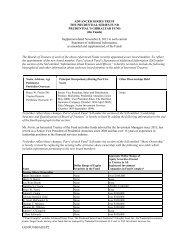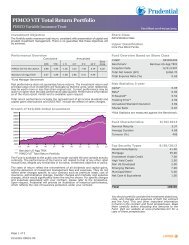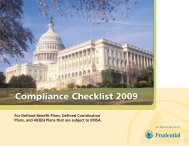The Prudential Series Fund
The Prudential Series Fund
The Prudential Series Fund
Create successful ePaper yourself
Turn your PDF publications into a flip-book with our unique Google optimized e-Paper software.
General Risks of Real Property Investments<br />
By participating in the Real Property Account and thereby in the investment performance of the Partnership, you will<br />
be subject to many of the risks of real property investments. <strong>The</strong>se include:<br />
1. Risks of Ownership of Real Properties. <strong>The</strong> Partnership will be subject to the risks inherent in the ownership of<br />
real property such as fluctuations in occupancy rates and operating expenses and variations in rental schedules. It<br />
may be adversely affected by general and local economic conditions, the supply of and demand for properties of the<br />
type in which the Partnership invests, zoning laws, and real property tax rates. Operation of property in which the<br />
Partnership invests will primarily involve rental of that property to tenants. <strong>The</strong> financial failure of a tenant resulting in<br />
the termination of their lease might cause a reduction in the cash flow to the Partnership. If a lease is terminated,<br />
there is no assurance that the Partnership will be able to find a new tenant for the property on terms as favorable to<br />
the Partnership as those from the prior tenant. Investments in hotels are subject to additional risk from the daily<br />
turnover and fluctuating occupancy rates of hotel rooms and the absence of long-term tenants.<br />
<strong>The</strong> Partnership's properties will also be subject to the risk of loss due to certain types of property damage (such as<br />
from nuclear power plant accidents and wars), which are either uninsurable or not economically insurable.<br />
2. Risks of Mortgage Loan Investments. <strong>The</strong> Partnership's mortgage loan investments will be subject to the risk of<br />
default by the borrowers. In this event the Partnership would have the added responsibility of foreclosing on or<br />
pursuing other remedies on the underlying properties to protect the value of its mortgage loans. A borrower's ability to<br />
meet its mortgage loan payments will be dependent upon the risks generally inherent to the ownership of real property.<br />
Mortgage loans made by the Partnership will generally not be personal obligations of the borrowers. <strong>The</strong> Partnership<br />
will only rely on the value of the underlying property for its security. Mechanics', material men's, government, and<br />
other liens may have or obtain priority over the Partnership's security interest in the property.<br />
In addition, the Partnership's mortgage loan investments will be subject to prepayment risks. If the terms of the<br />
mortgage loans permit, mortgagors may prepay the loans, thus possibly changing the Partnership's return.<br />
Junior mortgage loans (including wraparound mortgage loans) will be subject to greater risk than first mortgage loans,<br />
since they will be subordinate to liens of senior mortgagees. In the event a default occurs on a senior mortgage, the<br />
Partnership may be required to make payments or take other actions to cure the default (if it has the right to do so) in<br />
order to prevent foreclosure on the senior mortgage and possible loss of all or portions of the Partnership's investment.<br />
"Due on sale" clauses included in some senior mortgages, accelerating the amount due under the senior mortgage in<br />
the case of sale of the property, may be applied to the sale of the property upon foreclosure by the Partnership of its<br />
junior mortgage loan.<br />
<strong>The</strong> risk of lending on real estate increases as the proportion, which the amount of the mortgage loan bears to the fair<br />
market value of the real estate increases. <strong>The</strong> Partnership usually does not make mortgage loans of over 80% of the<br />
estimated or appraised value of the property that secures the loan. <strong>The</strong>re can be no assurance, that in the event of a<br />
default, the Partnership will realize an amount equal to the estimated or appraised value of the property on which a<br />
mortgage loan was made.<br />
Mortgage loans made by the Partnership may be subject to state usury laws. <strong>The</strong>se laws impose limits on interest<br />
charges and possible penalties for violation of those limits, including restitution of excess interest, unenforceability of<br />
debt, and treble damages. <strong>The</strong> Partnership does not intend to make mortgage loans at usurious rates of interest.<br />
Uncertainties in determining the legality of interest rates and other borrowing charges under some statutes could result<br />
in inadvertent violations, in which case the Partnership could incur the penalties mentioned above.<br />
3. Risks with Participations. <strong>The</strong> Partnership may seek to invest in mortgage loans and Leasebacks with<br />
Participations, which will provide the Partnership with both fixed interest and additional interest based upon gross<br />
revenues, sale proceeds, and/or other variable amounts. If the interest income received by the Partnership is based,<br />
in part, on a percentage of the gross revenues or sale proceeds of the underlying property, the Partnership's income<br />
will depend on the success in the leasing of the underlying property, the management and operation of such property<br />
by the borrower or lessee and upon the market value of the property upon ultimate disposition. If the Partnership<br />
negotiates a mortgage loan with a lower fixed interest rate and an additional percentage of the gross revenues or<br />
eventual sale proceeds of the underlying property, and the underlying property fails to generate increased revenues or<br />
to appreciate, the Partnership will have foregone a potentially greater fixed return without receiving the benefit of<br />
appreciation. State laws may limit Participations. In the event of the borrower’s bankruptcy, it is possible that as a<br />
result of the Partnership's interest in the gross revenues or sale proceeds, a court could treat the Partnership as a<br />
partner or joint venturer with the borrower, and the Partnership could lose the priority its security interest would have<br />
been given, or be liable for the borrower’s debts. <strong>The</strong> Partnership will structure its Participations to avoid being<br />
characterized as a partner or joint venturer with the borrower.<br />
10 - Real Property



